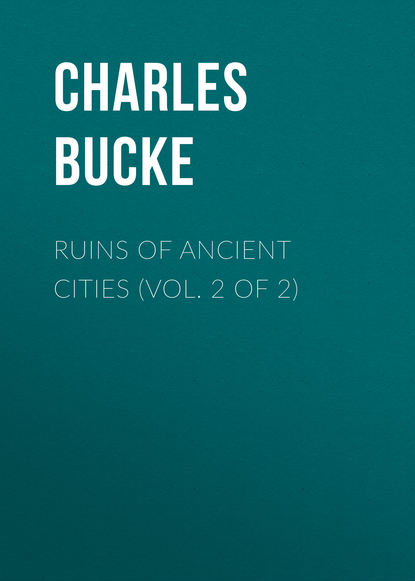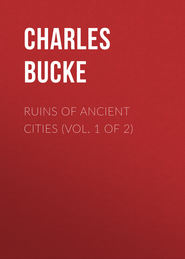По всем вопросам обращайтесь на: info@litportal.ru
(©) 2003-2024.
✖
Ruins of Ancient Cities (Vol. 2 of 2)
Настройки чтения
Размер шрифта
Высота строк
Поля
The folly of the Egyptians in respect to their deifications is well known; and for this they are ingeniously reproached by the Satirist.
Who has not heard, where Egypt’s realms are named,
What monster gods her frantic sons have framed?
Here Ibis gorged with well-grown serpents, there
The Crocodile commands religious fear.
Through towns Diana’s power neglected lies,
Where to her dogs aspiring temples rise;
And should you leeks or onions eat, no time
Would expiate the sacrilegious crime.
Religious nations sure, and blest abodes,
Where every orchard is o’er-run with gods!
270
Parker.
271
Knight.
272
Anon.
273
In antiquity, the pyramids of Egypt surpass every other monument now existing; but they do not, of course, from the nature of their construction, at all vie with the magnificence of the ruins of Karnac. – Wilkinson.
274
Jacob went into Egypt with his whole family, which met with the kindest treatment from the Egyptians; but after his death, say the Scriptures, there arose up a new king, which knew not Joseph. Rameses-Miamun, according to archbishop Usher, was the name of this king, who is called Pharaoh in scripture. He reigned sixty-six years, and oppressed the Israelites in a most cruel manner. He set over them task-masters, to afflict them with their burdens. “And they built for Pharaoh treasure-cities, Pithom and Raamses; and the Egyptians made the children of Israel serve with rigour, and they made their lives bitter with hard bondage, in mortar and in brick, and in all manner of service in the field; all their service wherein they made them serve, was with rigour.” – Prideaux.
275
Harmonies of Nature.
276
Saturday Magazine.
277
Belzoni’s Narrative. London 1820, p. 39.
278
Parker.
279
Penny Magazine.
280
Why was this necessary? and who recompensed the poor villagers?
281
Herodotus; Diodorus; Strabo; Tacitus; Prideaux; Rollin; Pococke; Savary; Fleurieu; Sonnini; Lindsay; Browne; Denon; Belzoni; Carne; Champollion; Soane; Heeren; Wilkinson; Richardson; Penny Magazine; Saturday Magazine; Egyptian Antiquities; Encyclopedia Metropolitana; Rees; Brewster; Londinensis.
282
Not of Virgil, but of Lucan. Phars. lib. ix.
283
“I am inclined to believe,” continues he, “that if Helen had been actually in Troy, the Trojans would certainly have restored her to the Greeks, with or without the consent of her paramour.”
284
The signification of the name Sigéum appears in an anecdote of an Athenian lady, celebrated for her wit, not her virtue. Wearied by the loquacity of a visitor, she inquired of him, “Whether he did not come from the Hellespont?” On his answering in the affirmative, she asked him “how it happened that he was so little acquainted with the first of the places there?” On his demanding, “Which of them?” she pointedly replied, “Sigéum;” thus indirectly bidding him to be silent. – (Diogenes Laertius.) Chandler.
285
Two promontories forming the bay before Troy.
286
An island in the Ægean Sea.
287
Annal. lib. ii. c. 54.
288
Sir John Hobhouse says, “I traced all the windings of the Mendar, startling young broods of ducks, and flocks of turtle-doves, out of every bush. Nothing could be more agreeable than our frequent rambles along the banks of this beautiful stream. The peasants of the numerous villages, whom we frequently encountered ploughing with their buffaloes, or driving their creaking wicker cars laden with faggots from the mountains, whether Greeks or Turks, showed no inclination to interrupt our pursuits. The whole region was, in a manner, in possession of the Salsette’s men, parties of whom, in their white summer dresses, might be seen scattered over the plain, collecting the tortoises which swarm on the sides of the rivulet, and are found under every furze-bush.” – LETTER XXXIX. 4to.
289
Callifat water is the Simois. Dr. Clarke says, that he saw in this stream hundreds of tortoises, which, being alarmed at his approach, fell from its banks into the water, as well as from the overhanging branches and thick underwood, among which these animals, – of all others the least adapted to climb trees, – had singularly obtained a footing. Wild-fowl, also, were in abundance.
290
“Turks were employed raising enormous blocks of marble from foundations surrounding the place; possibly the identical works constructed by Lysimachus, who fenced New Ilium with a wall. The appearance of the structure exhibited that colossal and massive style of architecture, which bespeaks the masonry of the early ages of Grecian history.”
291






